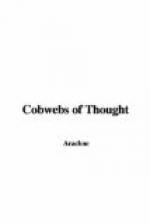Another philosophical victim to the same habit was John Stuart Mill, at one time of his life. His father analysed almost everything, except himself, and John Stuart Mill had grown up in this logical atmosphere of analysis, and to much profit as his works show. But when he turned the microscope on his own states of feeling, and on the aims of his life, the result was melancholia—almost disease of mind. His grandly developed faculty of analysis when devoted to definite knowledge outside himself, produced splendid results, as in his Logic, and his Essays, but when he analysed himself, he gained no additional knowledge, but a strange morbid horror that all possible musical changes might be exhausted, and that there might be no means of creating fresh ones. He also feared that should all the reforms he, and others, worked for, be accomplished, the lives of the reformers would become meaningless and blank, since they were working for means, not ends in themselves. Out of this hopeless mental condition there was only one outlet possible, and that was to leave self-analysis of this sort alone for ever, and to throw himself into its direct contrary, the unconscious life of the emotions. John Stuart Mill did this, and it saved him. In Wordsworth’s poetry he found sanity and healing. Happily for him that was not the age of Browning’s “Fifine at the Fair.” Had he fallen in with dialectical analysis in the garb of poetry, it must have killed him!
And yet “Know thyself” has always been considered supremely excellent advice, as true for our time, as for the age of Socrates. It certainly is disregarded by most of us, as fully as it was by many of the Greeks, whom Socrates interrogated so ruthlessly. Is there then a sort of self-analysis, which can be carried out for its own sake, and which can be, at the same time, of vital use? Is all self-analysis when practised for its own sake necessarily harmful, and unprofitable? It is time to ask these questions if we are ever to know how to analyse ourselves with profit, if we are ever to know ourselves. And we none of us do. As students, we are content with every other knowledge but this. After all the self probing of the religious and philosophical, during long centuries, what have we learned? Truly to ourselves, we are enigmas. To know everything else except the self that knows, what a strange position! But it is our condition. The one thing that we do not know—that we feel as if we never could know is the Self in us. Our characters, our powers, our natures, our being—what are they? Our faculties—what can we do? And what can we not do? What is the reason of this faculty, or that want of faculty? We have never reached an understanding of ourselves, which makes us not only know, but perceive what we are capable of knowing; which makes us aware, not only that we can do something, but why we can do it. We are an unknown quantity to ourselves. We can calculate on a given action in a machine, but we cannot calculate




